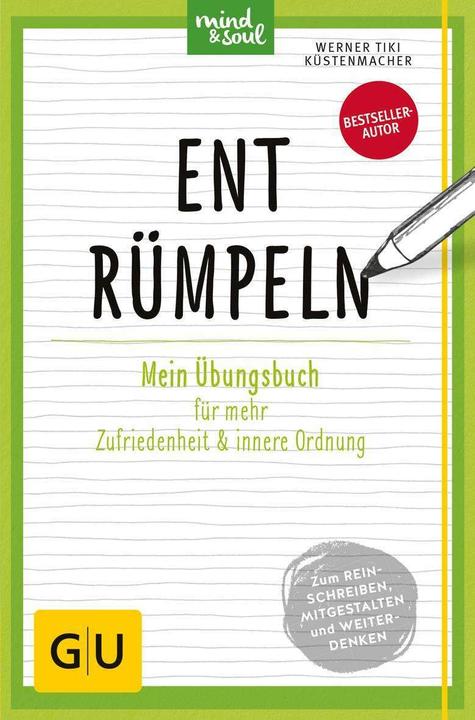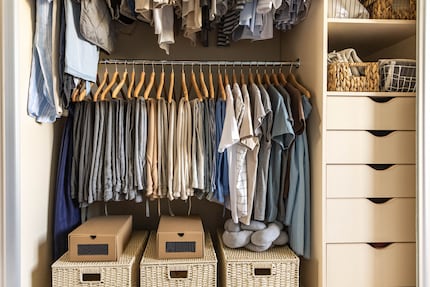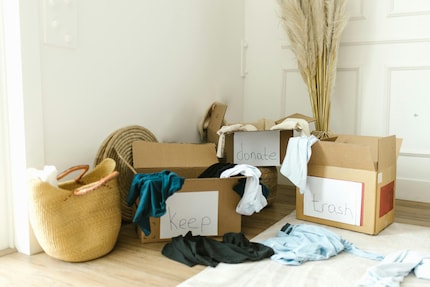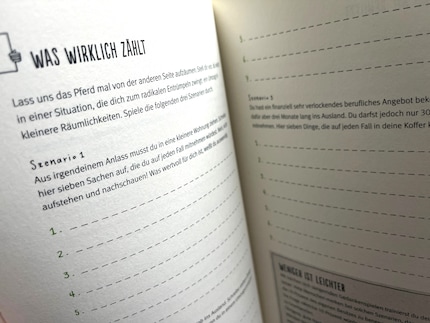

More than tidying: how decluttering frees you up inside
Tidiness instead of chaos: this has a huge impact on your well-being. With these tips, you can easily declutter and create mental ease at the same time. With a book tip.
When you walk through your home, you see furniture, books and loose documents. But your nervous system silently and constantly registers something else: clutter. A messy home can subtly affect you more than you might think. Decluttering entire rooms - or even just small areas such as a single drawer - can have a huge effect on your psyche.
Perceived clutter causes stress
This is not just a subjective realisation of people who love order, but scientifically proven. In a study conducted by the University of California
investigated how the perceived state of one's own home is linked to stress hormones such as cortisol - especially in women, as they showed the clearest correlation. The researchers followed 60 working couples over several days, recorded their cortisol levels and analysed how they described their home.
The result: women who used terms such as «chaotic», « cluttered» or «never finished» showed a significantly flatter drop in cortisol over the course of the day - a biological sign of chronic stress. Conversely, those who perceived their home as «restful» or «pleasant» had healthier cortisol levels and reported a better mood. What is exciting here is that it was not the actual amount of things that was decisive, but the personal experience of order or excessive demands. In other words, the subjective impression of clutter.

Source: Shutterstock
Chaos as implicit task overkill
From a neuroscientific point of view, our visual system lags behind when there is a lot of clutter: visual stimuli (a pile of books, a dirty cup, a tangle of cables) constantly have to be evaluated. Is this important or irrelevant stuff? These constant small decisions take up cognitive resources. The result: your concentration drops, you become tired, but you don't get a real sense of calm. In highly crowded environments - as can occur with Hoarding Disorder - sleep quality and life satisfaction are often impaired.
This is why decluttering is doubly worthwhile, because it's not just about restoring order. It's a small but effective intervention for your nervous system - it affects your stress levels, your alertness and your mental well-being.
Three tips on how to declutter more easily
You can implement these three steps immediately. The goal doesn't have to be to create perfect minimalism, but a space that feels good for you.

Source: Shutterstock
1. start small
Of course, you want to organise everything as soon as you start. But then you're bound to be overwhelmed. So instead of turning the whole house upside down, choose a drawer, a shelf or a corner. Something you can tidy up in a maximum of 15 minutes. This will give you the good feeling of having achieved something - the keyword here is positive feedback.
2. perception counts more than quantity
Listen to your feelings: studies have shown that it's not about the absolute quantity of things, but how they affect you. If you have 50 books that make you happy - great. If you have 50 books that give you the implicit order to weed them out, it's a burden. As long as the thought «I need to tidy up» resonates as you look around the room, your nervous system will remain tense.
3. combine letting go with a positive goal
If you associate decluttering with a desire (e.g. for peace and quiet) - not with pressure - it will be easier to let go. Imagine what it will feel like when you have decluttered. «I want less stuff» sounds abstract. Better: «I want to relax on the sofa in the evening without staring at open tasks» - that's a concrete feeling that's worth working towards.
And remember: if you find it emotionally difficult to let go, you're not just lazy or disorganised. There may be a deeper psychological connection - and that's okay.

Source: Shutterstock
The effect: What tidying and decluttering changes
If you regularly take small steps, the following will happen:
- Your stress level decreases. You will carry noticeably less mental baggage.
- Your concentration improves. Your brain needs less energy to filter stimuli. You are more focussed.
- Your well-being increases. Because a room that you like allows your nervous system to slow down.
- Your sleep can improve. The fewer «I still need to tidy up» thoughts you have, the easier it is for your mind to switch off.
Book tip: decluttering with company

Many tasks are easier when you're not alone. It's a recommendation that no guidebook on the topic is complete without the help of a friend. But if there's no one around to join in, I can recommend this printed companion. The exercise book by bestselling author Werner Tiki Küstenmacher is a mixture of short texts that explain the background, motivating words and very specific tasks that make decluttering easier.

Source: Anna Sandner
Here you will learn, for example, how to avoid overwhelming yourself to such an extent that motivation turns into frustration. Or that sorting things out is much quicker and less complicated if you do it according to clear criteria: get rid of duplicates, useless, broken and ugly items and the chaos will clear up.
The author encourages you to celebrate even the smallest successes. He also has a few tricks up his sleeve. Like turning the tables for once: Instead of weighing up your raison d'être item by item, think about what you would absolutely take with you if you were reluctant to move into a smaller flat, or went abroad for two months. Or even more radically: you would start a new life with just two suitcases. These mind games train you to let go and make it clear what you're really attached to.
Science editor and biologist. I love animals and am fascinated by plants, their abilities and everything you can do with them. That's why my favourite place is always the outdoors - somewhere in nature, preferably in my wild garden.
Practical solutions for everyday problems with technology, household hacks and much more.
Show all

